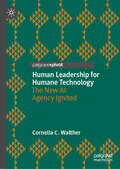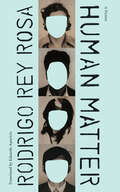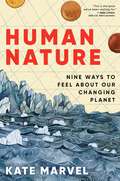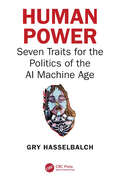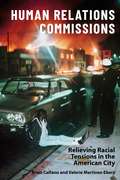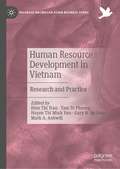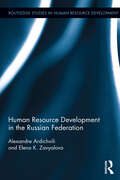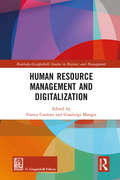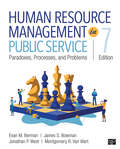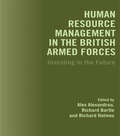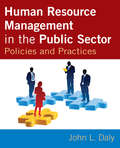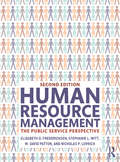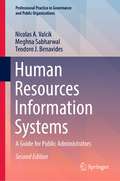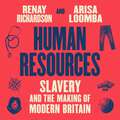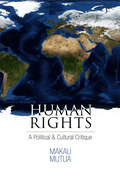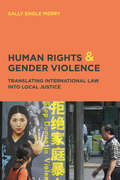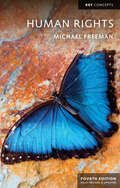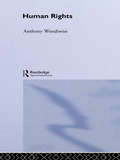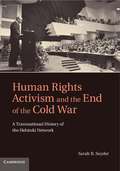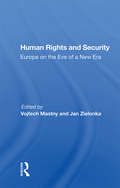- Table View
- List View
Human Leadership for Humane Technology: The New AI: Agency Ignited
by Cornelia C. WaltherThis book explores the relationship of natural and artificial intelligence in our rapidly evolving world. It does so anchored in an innovative multidisciplinary framework and the premise that society is a composition of multiple dimensions, with individuals (micro), communities (meso), countries (macro) and planet (meta) in the collective sphere, and individuals themselves as multidimensional beings (aspirations, emotions, thoughts, sensations). This perspective is applied to analyze the implications of our transition into a phase where online and offline realms are increasingly intertwined. Special attention is given to the influence of all pervasive technology on our perception of the self and society. The central message is that we must learn to harness Agency amid AI, which entails double literacy – of artificial and natural intelligence.
Human Matter: A Fiction (Latin American Literature in Translation)
by Rodrigo Rey RosaThis prizewinning Guatemalan author&’s meta-novel delves into the secret police records and history of political violence in his homeland. In 2005, novelist Rodrigo Rey Rosa started visiting the Historical Archive of the Guatemala National Police, where millions of previously hidden records were being cataloged, bringing to light detailed evidence of crimes against humanity. In response, Rey Rosa crafted a meta-novel that weaves the language of arrest records and surveillance reports with the contemporary journal entries of a novelist (named Rodrigo) who is attempting to synthesize the stories of political activists, indigenous people, and others ensnared in a deadly web of state-sponsored terrorism. When Rodrigo&’s access to the archive is suspended, he proceeds to the General Archives of Central America and the Library of Congress, also collaborating with the son of the Identification Bureau's former head in a relentless pursuit of understanding. Human Matter is both a tour de force of fiction and a sobering meditation on the realities of collective memory, raising timely questions about how our history is recorded and retold.
Human Matter: A Fiction (Latin American Literature in Translation)
by Rodrigo Rey RosaThis prizewinning Guatemalan author&’s meta-novel delves into the secret police records and history of political violence in his homeland. In 2005, novelist Rodrigo Rey Rosa started visiting the Historical Archive of the Guatemala National Police, where millions of previously hidden records were being cataloged, bringing to light detailed evidence of crimes against humanity. In response, Rey Rosa crafted a meta-novel that weaves the language of arrest records and surveillance reports with the contemporary journal entries of a novelist (named Rodrigo) who is attempting to synthesize the stories of political activists, indigenous people, and others ensnared in a deadly web of state-sponsored terrorism. When Rodrigo&’s access to the archive is suspended, he proceeds to the General Archives of Central America and the Library of Congress, also collaborating with the son of the Identification Bureau's former head in a relentless pursuit of understanding. Human Matter is both a tour de force of fiction and a sobering meditation on the realities of collective memory, raising timely questions about how our history is recorded and retold.
Human Mobility and Technological Transfer in the Prehistoric Mediterranean: Human Mobility and Technological Transfer In The Prehistoric Mediterranean
by Carl Knappett Evangelia KiriatziThe diverse forms of regional connectivity in the ancient world have recently become an important focus for those interested in the deep history of globalisation. This volume represents a significant contribution to this new trend as it engages thematically with a wide range of connectivities in the later prehistory of the Mediterranean, from the later Neolithic of northern Greece to the Levantine Iron Age, and with diverse forms of materiality, from pottery and metal to stone and glass. With theoretical overviews from leading thinkers in prehistoric mobilities, and commentaries from top specialists in neighbouring domains, the volume integrates detailed case studies within a comparative framework. The result is a thorough treatment of many of the key issues of regional interaction and technological diversity facing archaeologists working across diverse places and periods. As this book presents key case studies for human and technological mobility across the eastern Mediterranean in later prehistory, it will be of interest primarily to Mediterranean archaeologists, though also to historians and anthropologists.
Human Nature: Nine Ways to Feel About Our Changing Planet
by Kate MarvelA captivating exploration of climate change that uses nine different emotions to better understand the science, history, and future of our evolving planetScientist Kate Marvel has seen the world end before, sometimes several times a day. In the computer models she uses to study climate change, it’s easy to simulate rising temperatures, catastrophic outcomes, and bleak futures. But climate change isn’t just happening in those models. It’s happening here, to the only good planet in the universe. It’s happening to us. And she has feelings about that. Human Nature is a deeply felt inquiry into our rapidly changing Earth. In each chapter, Marvel uses a different emotion to explore the science and stories behind climate change. As expected, there is anger, fear, and grief—but also wonder, hope, and love. With her singular voice, Marvel takes us on a soaring journey, one filled with mythology, physics, witchcraft, bad movies, volcanoes, Roman emperors, sequoia groves, and the many small miracles of nature we usually take for granted.Hopeful, heartbreaking, and surprisingly funny, Human Nature is a vital, wondrous exploration of how it feels to live in a changing world.Human Nature is a biography of the Earth in nine emotions:WonderAngerGuiltFearGriefSurprisePrideHopeLove
Human Porterage and Colonial State Formation in German East Africa, 1880s–1914: Tensions of Transport (Cambridge Imperial and Post-Colonial Studies)
by Andreas GreinerThis book explores the role of caravan transport and human porterage in the colony of German East Africa (present-day mainland Tanzania, Rwanda, and Burundi). With caravan mobility being of pivotal importance to colonial rule during the late nineteenth and early twentieth centuries, the exploration of vernacular transport and its governance during this period sheds new light on the trajectories of colonial statehood. The author addresses key questions such as the African resilience to colonial interventions, the issue of labor recruitment, and the volatility of colonial infrastructure. This book unveils a fundamental contradiction in the way that German administrators dealt with precolonial modes of transport in East Africa. While colonizers championed for the abolishment of caravan transport, they strongly depended on porters in the absence of pack animals or railways. To bring this contradiction to the fore, the author studies the shifting role of caravans in East Africa during the era of ‘high imperialism.’ Uncovering the extent to which porters and caravan entrepreneurs challenged and shaped colonial policymaking, this book provides an insightful read for historians studying German Empire and African history, as well as those interested in the history of transport and infrastructure.
Human Power: Seven Traits for the Politics of the AI Machine Age
by Gry HasselbalchThe rapid and tumultuous technological transformation of our societies has triggered a self-exploratory public debate about what it means to be human. What are our human potential, talents, and powers – what, essentially, is our place in the modern world? Will a culture of machines out-compete a culture of humanity?In this thought-provoking but ultimately hopeful book, scholar and leading technology critic Gry Hasselbalch invites readers to reflect on the shifting dynamics between humans and the AI-powered technologies increasingly shaping our world. Exploring the distinctiveness of human power, the book addresses current debates about technology that portray humans as powerless and flawed – in essence outdated software in dire need of a technological fix – arguing that human power must remain central in discussions about AI and technology. It investigates seven key traits which set humans apart from machines: Creativity, Intuition, Emotion, Life, Defiance, Love, and Wisdom. Drawing on interviews and examples from across arts – including literature, visual arts, film and music – and from technology politics and policymaking, Human Power explains how these traits provide a foundation for a new politics in the AI Machine Age. One that does not diminish and reduce human power, but actively protects and reinforces it.If human power is not a computational process, then what is it? Human Power: Seven Traits for the Politics of the AI Machine Age gives human power – our humanity and fundamental “humanness” – a renewed voice in a debate dominated by fears and preconceptions about technological power. This important new work will appeal to journalists, policymakers, artists, and educators—and anyone else interested in the rapidly growing role of AI and digital technology in our lives.
Human Relations Commissions: Relieving Racial Tensions in the American City
by Prof Valerie Martinez-Ebers Prof. Brian CalfanoDuring the 1950s, amid increased attention to the problems facing cities—such as racial disparities in housing, education, and economic conditions; tense community-police relations; and underrepresentation of minority groups—local governments developed an interest in “human relations.” In the wake of the shocking 1965 Watts uprising, a new authority was created: the Los Angeles City Human Relations Commission. Today, such commissions exist all over the United States, charged with addressing such tasks as fighting racial discrimination and improving fair housing access.Brian Calfano and Valerie Martinez-Ebers examine the history and current efforts of human relations commissions in promoting positive intergroup outcomes and enforcing antidiscrimination laws. Drawing on a wide range of theories and methods from political science, social psychology, and public administration, they assess policy approaches, successes, and failures in four cities. The book sheds light on the advantages and disadvantages of different commission types and considers the stresses and expectations placed on commission staff in carrying out difficult agendas in highly charged political contexts. Calfano and Martinez-Ebers suggest that the path to full inclusion is fraught with complications but that human rights commissions provide guidance as to how disparate groups can be brought together to forge a common purpose. The first book to examine these widely occurring yet understudied political bodies, Human Relations Commissions is relevant to a range of urban policy issues of interest to both academics and practitioners.
Human Resource Development in Vietnam: Research and Practice (Palgrave Macmillan Asian Business Series)
by Mark A. Ashwill Gary N. McLean Hien Thi Tran Tam To Phuong Huyen Thi Minh VanDespite recent high GDP growth rates, Vietnam remains a developing country in need of developing human resources (HR) of both genders. This can be done through education, workplace training, corporate social responsibility, policies for gender equality, support for entrepreneurship, and other practices and policies. Yet, national human resource development (NHRD) is a relatively new concept in Vietnam. This edited volume highlights the importance of HR, HRD, and NHRD, enabling Vietnam to experience sustainable growth and become a modern industrial country. It examines the positive changes effected by HRD considering Vietnam’s unique historical, political, economic, and cultural contexts. This book offers scholars and practitioners an indigenous HRD approach and discusses implications for future research and practices.
Human Resource Development in the Russian Federation (Routledge Studies in Human Resource Development)
by Alexandre Ardichvili Elena ZavyalovaUnlike Brazil, India, or China, prior to the beginning of market-oriented reforms in early 1990s, Russia maintained a high level of human capital and possessed a highly developed system of vocational education, continuous education, and management development institutions sponsored by the government. However, after the beginning of the market reforms many state-sponsored programs were disbanded and individual enterprises and newly emerging private educational institutions found themselves in a position of having to provide training and professional development services for future and current employees. Both government-level policies in support of HRD and enterprise-level HRD systems have emerged fairly recently in the Russian Federation, and are still in a stage of change and development. This book provides an in-depth analysis of the current state of HRD in the Russian Federation. It covers country-level policies, organizational-level programs and strategies, and individual-level educational and training efforts. While the study is focused on Russia, its conclusions will be of value to scholars, students, and practitioners examining similar issues surrounding the emergence and development of HRD systems in emerging countries. Furthermore, the authors’ framework for analyzing HRD on multiple levels and across various parts of the adult and vocational education and development systems offers a unique and important contribution to the theoretical debate on comparative educational systems outside the HRD and HRM communities.
Human Resource Management and Digitalization (Routledge-Giappichelli Studies in Business and Management)
by Franca Cantoni Gianluigi MangiaDigitalization is changing the world of work. Technology is shifting the relationship between workers and machines and how work is organized; new skills are becoming increasingly relevant in the workplace where workers no longer work for a single company, in 9-to-5 jobs, five days a week. Industry 4.0, also known as the Fourth Industrial Revolution, is revolutionizing the way managers can design, control and improve their activities. While the nature of the tasks and the interdependences between individuals are changing, the impact of intelligent technologies is severely questioning the span of control of leaders and the effectiveness of their leadership styles. The authors sketch out the main changes occurring in the business landscape and identify the new expectations that organizations are formulating for leaders across several industries. In an age in which new leadership models are about to emerge, they describe how the relevant changes impact and shape the managerial arena. This book sets the stage for a new way of thinking on the nature of the relationship between HR and technology. It examines the influence of Industry 4.0 and Innovation 4.0, (i.e. the connection between physical and digital processes in industrial production, where human competencies and machine potential are strictly interconnected throughout the entire value chain), from a myriad of viewpoints: namely in terms of structures, practices, influences (learning, training and communication), competencies and roles. A chapter is also dedicated to the understanding of the impact of Innovation 4.0, in the context of European Universities through E-learning Experiences where a multiple-case study analysis is provided.
Human Resource Management in Public Service: Paradoxes, Processes, and Problems
by James S. Bowman Jonathan P. West Evan M. Berman Montgomery R. Van WartHuman Resource Management in Public Service: Paradoxes, Processes, and Problems offers provocative and thorough coverage of the complex issues faced by employees and managers in the public sector, including managing under tight budgets with increasing costs, hiring freezes, contracting out, and the politicization of the civil service. Continuing the award-winning tradition of previous editions, authors Evan M. Berman, James S. Bowman, Jonathan P. West, and Montgomery R. Van Wart encourage active learning through various skill-building exercises and a mixture of individual, group, and in-class tasks. The Seventh Edition includes new examples on how COVID-19 has disrupted the workplace, equity and racial discord, organizational diversity, employee engagement and motivation, leadership development training, work-life balance, gender-based inequities, behavioral biases in appraisal, and unionization trends.
Human Resource Management in Public Service: Paradoxes, Processes, and Problems
by James S. Bowman Jonathan P. West Evan M. Berman Montgomery R. Van WartHuman Resource Management in Public Service: Paradoxes, Processes, and Problems offers provocative and thorough coverage of the complex issues faced by employees and managers in the public sector, including managing under tight budgets with increasing costs, hiring freezes, contracting out, and the politicization of the civil service. Continuing the award-winning tradition of previous editions, authors Evan M. Berman, James S. Bowman, Jonathan P. West, and Montgomery R. Van Wart encourage active learning through various skill-building exercises and a mixture of individual, group, and in-class tasks. The Seventh Edition includes new examples on how COVID-19 has disrupted the workplace, equity and racial discord, organizational diversity, employee engagement and motivation, leadership development training, work-life balance, gender-based inequities, behavioral biases in appraisal, and unionization trends.
Human Resource Management in the British Armed Forces: Investing in the Future
by Richard Holmes Richard Bartle Alex AlexandrouThis study of the future of human resource management in the British armed forces considers the impace of the Human Rights Act 1998 and the Macpherson report. It covers ethnic minorities and gay rights as well as other challenging human resource issues.
Human Resource Management in the Public Sector: Policies and Practices
by John DalyThis affordable text covers the management of both human resource systems and employees in local government settings. It focuses on the significant changes facing local governments, especially the growing demand for increased Work-Life balance as an integral component of human resource management.
Human Resource Management: The Public Service Perspective
by Nicholas P. Lovrich Elizabeth D. Fredericksen Stephanie L. Witt W. David PattonSound HRM practices matter--they are a sine qua non of effective governance in democratic government--equally so at the local, regional, state and national levels of government. The NASPAA (Network of Schools of Public Policy, Affairs, and Administration) accreditation standards demand critical competencies for public managers that are vital to human resource managers and supervisors at all levels. These competencies include: skills to lead and manage in public governance; to participate in and contribute to the policy process; to analyze, synthesize, think critically, solve problems and make decisions; to articulate and apply a public service perspective; and to communicate and interact productively with a diverse and changing workforce and citizenry. This second edition of Human Resource Management is designed specifically with these competencies in mind to: Introduce and explore the fundamental purposes of human resource management in the public service and consider the techniques used to accomplish these purposes Provide exercises to give students practice for their skills after being introduced to the theory, foundation, and practices of public and nonprofit sector HRM Facilitate instruction of the material by introducing important topics and issues with readings drawn from the professional literature Provide information and examples demonstrating the interrelatedness of many of the topics in public sector HRM and the trends shaping public and nonprofit management, especially diversity, ethics, and technology. Demonstrate and describe differences among HRM practices in public, for-profit and nonprofit organizations, and between the levels of government. Human Resource Management is organized to provide a thorough discussion of the subject matter with extensive references to relevant literature and useful teaching tools. Thus, students will consider the issues, purposes, and techniques of HRM and conceptualize how varied their roles are, or will be, whether a personnel specialist in a centralized system or a supervisor managing in one of the increasingly common decentralized systems. Each chapter includes a thorough review of the principles and practices of HRM (including the why and the how), selected readings, important themes, diverse examples, key terms, study questions, applied exercises, case studies, and examples of forms and processes would-be managers will encounter in their roles.
Human Resources Information Systems: A Guide for Public Administrators (Professional Practice in Governance and Public Organizations)
by Nicolas A. Valcik Meghna Sabharwal Teodoro J. BenavidesThis volume provides an introduction to Human Resource Information Systems (HRIS) for those in the public administration field. At the intersection between human resource management and information technology, HRIS is often the key to having and maintaining the personnel data that is essential for hiring and recruitment, strategic planning and analysis, and legal requirements in most public organizations. Revised and updated for the second edition, this book describes what an HRIS system is, what the functionality of such a system should be, and outlines the practical aspects of an HRIS. It also compares the different aspects of human resources in public organizations, non-profit organizations, and private corporations, and how differences across organizations may influence the functionality requirements of the HRIS. Finally, the volume contains both an organizational theory component, which frames how an HRIS interacts with an organization both from a functional standpoint and a reporting standpoint. The book includes a practical component, which includes real-world case studies that illustrate the advantages and pitfalls to implementing an HRIS enterprise system. Providing a thorough introduction to HRIS for both academics and practitioners, this volume is appropriate for researchers, graduate students, and practitioners in the fields of public administration, higher education administration, information systems, computer science, and human resources.
Human Resources: Slavery and the Making of Modern Britain – in 39 Institutions, People, Places and Things
by Renay Richardson Arisa LoombaOrdinary items take on new meanings when you cast them in different light. The origins of tea, coffee and sugar are well known, but when you discover that gym treadmills were pioneered on plantations or that denim jeans were once clothing for enslaved people, you can't help but ask where else the legacy of slavery hides in plain sight.Through the stories of thirty-nine everyday places and objects, Renay Richardson and Arisa Loomba unpick the threads of the history that we never learned in school, revealing the truth of how Britain's present is bound to a darker past.Taking us from art galleries to football stands, banks to hospitals, from grand country houses to the backs of our kitchen cupboards, Human Resources is an eye-opening inquiry that gives a voice to the enslaved people who built modern Britain.
Human Rights
by Cindy Holder David ReidyThe United Nations General Assembly adopted the Universal Declaration of Human Rights in 1948. A burgeoning human rights movement followed, yielding many treaties and new international institutions and shaping the constitutions and laws of many states. Yet human rights continue to be contested politically and legally and there is substantial philosophical and theoretical debate over their foundations and implications. In this volume distinguished philosophers, political scientists, international lawyers, environmentalists and anthropologists discuss some of the most difficult questions of human rights theory and practice: What do human rights require of the global economy? Does it make sense to secure them by force? What do they require in jus post bello contexts of transitional justice? Is global climate change a human rights issue? Is there a human right to democracy? Does the human rights movement constitute moral progress? For students of political philosophy, human rights, peace studies, and international relations.
Human Rights
by Makau MutuaIn 1948 the United Nations adopted the Universal Declaration of Human Rights, and with it a profusion of norms, processes, and institutions to define, promote, and protect human rights. Today virtually every cause seeks to cloak itself in the righteous language of rights. But even so, this universal reliance on the rights idiom has not succeeded in creating common ground and deep agreement as to the scope, content, and philosophical bases for human rights.Makau Mutua argues that the human rights enterprise inappropriately presents itself as a guarantor of eternal truths without which human civilization is impossible. Mutua contends that in fact the human rights corpus, though well meaning, is a Eurocentric construct for the reconstitution of non-Western societies and peoples with a set of culturally biased norms and practices.Mutua maintains that if the human rights movement is to succeed, it must move away from Eurocentrism as a civilizing crusade and attack on non-European peoples. Only a genuine multicultural approach to human rights can make it truly universal. Indigenous, non-European traditions of Asia, Africa, the Pacific, and the Americas must be deployed to deconstruct--and to reconstruct--a universal bundle of rights that all human societies can claim as theirs.
Human Rights & Gender Violence: Translating International Law into Local Justice (Chicago Series In Law And Society Ser.)
by Sally Engle MerryHuman rights law and the legal protection of women from violence are still fairly new concepts. As a result, substantial discrepancies exist between what is decided in the halls of the United Nations and what women experience on a daily basis in their communities. Human Rights and Gender Violence is an ambitious study that investigates the tensions between global law and local justice. As an observer of UN diplomatic negotiations as well as the workings of grassroots feminist organizations in several countries, Sally Engle Merry offers an insider's perspective on how human rights law holds authorities accountable for the protection of citizens even while reinforcing and expanding state power. Providing legal and anthropological perspectives, Merry contends that human rights law must be framed in local terms to be accepted and effective in altering existing social hierarchies. Gender violence in particular, she argues, is rooted in deep cultural and religious beliefs, so change is often vehemently resisted by the communities perpetrating the acts of aggression. A much-needed exploration of how local cultures appropriate and enact international human rights law, this book will be of enormous value to students of gender studies and anthropology alike.
Human Rights (Key Concepts)
by Michael FreemanHuman Rights, now in its fourth edition, is an introductory text that is both innovative and challenging. Its unique interdisciplinary approach invites students to think imaginatively and rigorously about one of the most important and influential political concepts of our time. Tracing the history of the concept, the book shows that there are fundamental tensions between legal, philosophical and social-scientific approaches to human rights. This analysis throws light on some of the most controversial issues in the field: What are the causes of human-rights violations? Is the idea of universal human rights consistent with respect for cultural difference? Are we living in a ‘post-human rights’ world? Thoroughly revised and updated, the new edition engages with recent developments, including the Trump and Biden presidencies, colonial legacies, neoliberalism, conflict in Syria, Yemen and Myanmar, the Covid-19 pandemic, new technologies and the supposed crisis of liberal democracy. Widely admired and assigned for its clarity and comprehensiveness, this book remains a ‘go-to’ text for students in the social sciences, as well as students of human-rights law who want an introduction to the non-legal aspects of their subject.
Human Rights (Key Ideas)
by Anthony WoodiwissAre human rights part of the problem or part of the solution in the current 'clash of civilizations'? Drawing on a hitherto neglected body of work in classical social theory and combining it with ideas derived from Barrington Moore, Norbert Elias and Michel Foucault, Woodiwiss poses and answers the questions: How did human rights become entangled with power relations? How might the nature of this entanglement be altered so that human rights better serve the global majority? In answering these questions, he explains how and why rights discourse developed in such distinctive ways in four key locations: Britain, the United States, Japan and in the UN. On this basis he provides, for the first time, a general sociological account of the development of international human rights discourse, which represents a striking challenge to current thinking and policy.
Human Rights Activism and the End of the Cold War
by Sarah B. SnyderTwo of the most pressing questions facing international historians today are how and why the Cold War ended. Human Rights Activism and the End of the Cold War explores how, in the aftermath of the signing of the Helsinki Final Act in 1975, a transnational network of activists committed to human rights in the Soviet Union and Eastern Europe made the topic a central element in East-West diplomacy. As a result, human rights eventually became an important element of Cold War diplomacy and a central component of détente. Sarah B. Snyder demonstrates how this network influenced both Western and Eastern governments to pursue policies that fostered the rise of organized dissent in Eastern Europe, freedom of movement for East Germans and improved human rights practices in the Soviet Union - all factors in the end of the Cold War.
Human Rights And Security: Europe On The Eve Of A New Era
by Jan Zielonka Vojtech MastnyInquiries into the relationship between security and human rights are of very recent vintage. They have long been hampered by political scientists' predilection for political "realism." From that perspective, there seemed little doubt that power comes first and any human rights but a poor second. As wishful thinking turned into reality during the Eastern European revolutions of 1989, the limitations of such shortsighted realism became apparent. This book examines the causes and consequences of the emerging new relationship between security and human rights. It is divided into two parts, which deal respectively with security and human rights and their relationship to states and societies. What is the theoretical linkage between security and human rights? How has this linkage evolved within the context of East-West relations? What was the particular role of the Helsinki process in shaping this evolution? How do these issues affect the difficult transition from dictatorship to pluralism in countries facing the challenge of ethnic, economic, and social dislocation? The contributors to this volume seek to deepen our understanding of the forces that brought about the collapse of communism in Europe, and they explore the broader implications of change for the emerging post-cold war international order.
